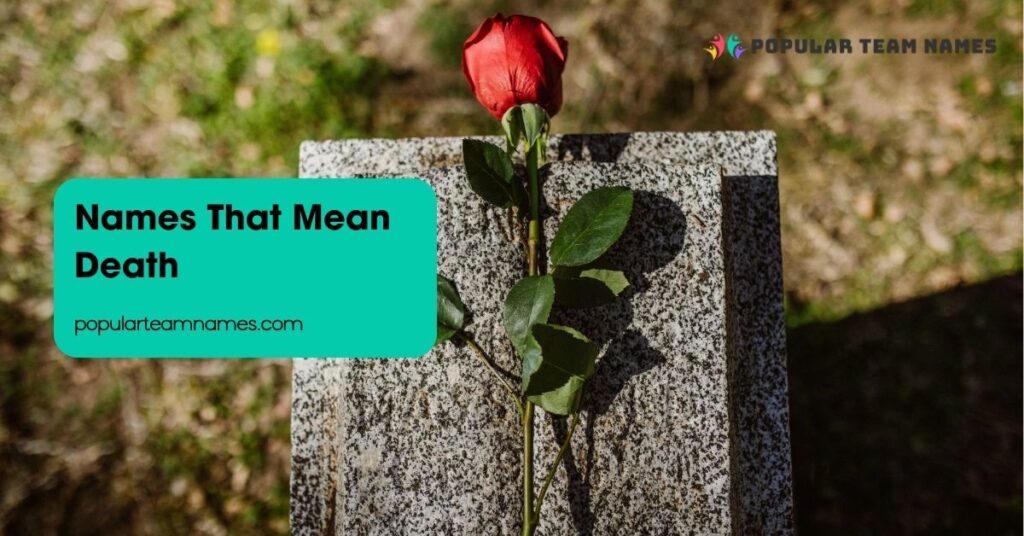Names hold power and meaning, often reflecting deep cultural roots and historical significance. When it comes to names that mean death, they carry a weight that can evoke curiosity and intrigue. These names, often steeped in mythology and folklore, can offer a glimpse into how different societies perceive mortality and the afterlife.
Imagine giving your child a name that resonates with strength and mystery. Names associated with death can symbolize transformation, renewal, and the cycle of life. Whether you’re searching for a unique name or exploring the darker side of nomenclature, understanding these meanings can enrich your perspective. Jump into this intriguing area and discover names that not only tell a story but also challenge conventional ideas of life and death.
Names That Mean Death
You might be surprised to learn that many names in various cultures symbolize death. These names often carry deep meanings and reflect societal views on mortality.
- Malik: In Arabic, Malik means king, but in some interpretations, it’s associated with death by referring to the king of the underworld.
- Achilles: Derived from Greek mythology, Achilles is known for his tragic fate in the Trojan War, making him synonymous with death and mortality.
- Morrigan: This name from Irish mythology represents a goddess associated with war and fate, often linked to death on the battlefield.
- Leila: The name Leila originates from Arabic and means night. In certain contexts, night symbolizes the end of life, lending a connection to the concept of death.
- Abaddon: This name, from Hebrew origins, translates to destruction or ruin and is often associated with the angel of death in biblical texts.
- Persephone: In Greek mythology, Persephone is the queen of the underworld, embodying the duality of life and death through her seasonal cycles.
- Tanatos: A direct reference to death in Greek mythology, Thanatos represents the personification of death itself, making it a powerful choice for those exploring themes of mortality.
- Lila: While Lila means play or amusement in many cultures, in certain traditions, it relates to the fleeting nature of life, indirectly connecting to death.
- Hades: Known as the god of the underworld in Greek mythology, Hades symbolizes the area of death, and the name embodies darkness and the afterlife.
- Raven: Associated with mystery and often linked to omens, the raven symbolizes death in various cultures due to its black plumage and scavenging nature.
Consider these names that mean death as distinct choices that challenge conventional perceptions. Through their meanings and cultural significances, they invite reflection on life’s transient nature.
Historical Names That Mean Death

Many names from history carry meanings associated with death, reflecting the cultural and social attitudes towards mortality. Here are some intriguing examples.
Names from Mythology
Thanatos stands out in Greek mythology as the personification of death. You’ll find that this name literally means “death” in Greek. Often depicted as a winged spirit, Thanatos represents the peaceful aspect of death, contrasting with the violent nature attributed to others. His stories influence various modern interpretations of mortality, making the name one of the most recognized in mythological contexts.
Names from Ancient Cultures
Mortimer originates from English and French roots, carrying a history linked to dangerous sea journeys. Parents used this name for children born during perilous times, especially those who survived shipwrecks. Over time, the name evolved to embody a connection with death.
Mortensen, a Danish and Norwegian surname, means “son of Morten.” The name Morten derives from Latin, translating to “dead” or “death,” embodying a legacy rooted in life and mortality.
Smrt translates directly to “death” in Czech. As a surname, it holds a powerful meaning, offering a stark reminder of life’s fragility.
Schwarztod, a German name, combines “black” and “death.” Its historical context often links to the devastating impact of the plague, symbolizing the darkness associated with that era.
Morselli, an Italian surname, originates from the word “morte,” also meaning death. It reflects cultural nuances surrounding mortality within the Italian-speaking industry.
Morteza, a Persian name, translates to “chosen by death.” This distinctive meaning offers a unique perspective on fate and life’s fleeting nature, inviting contemplation on destiny.
These historical names symbolize various cultural perspectives on death, inviting you to explore their backgrounds and the stories they tell.
Modern Names That Mean Death

Exploring modern names that signify death reveals unique options for both girls and boys. These names often blend cultural significance with an air of mystery.
Unique Names for Girls
- Abaddon: This name means doom and destruction, rooted in Hebrew culture. It carries a powerful connotation that evokes a sense of the unknown.
- Agrona: Known as the goddess of strife and slaughter, Agrona’s origins trace back to Old English and Celtic traditions. This name showcases strength and warrior spirit.
- Angerona: Representing the Roman goddess of death, Angerona reflects themes of silence and the winter solstice in its Latin roots. It’s a name shrouded in ancient mythology.
- Belladonna: Translated as “beautiful lady,” this name connects to a poisonous plant often associated with death. It’s both enchanting and eerie, perfect for a unique choice.
- Freyja: Known as the Norse goddess of love and death, Freyja carries a dual meaning. It encapsulates both beauty and the inevitability of mortality.
- Hecate: As the Greek goddess of witchcraft and the underworld, Hecate embodies mystical elements. This name resonates with those who appreciate the darker aspects of life.
- Keres: These female spirits symbolize death and doom in Greek mythology. Keres represents a captivating and powerful choice for a girl’s name.
- Lamia: This name references a mythological figure who preyed on young children. Its origins lie in Greek folklore, making it a deeply cutting choice.
Unique Names for Boys
- Morrigan: This name represents an Irish goddess linked to death on the battlefield. Morrigan conveys strength and a warrior’s spirit.
- Malik: Known as the king of the underworld, Malik adds a majestic twist to names associated with death. Its cultural roots provide depth and significance.
- Thanatos: Used to personify death in Greek mythology, Thanatos embodies a calm and peaceful aspect of mortality. It’s a unique yet popular choice for those fascinated by mythology.
- Achilles: Known for his tragic fate in Greek lore, Achilles carries weight and depth. This name invokes the idea of heroism intertwined with mortality.
- Morteza: This Persian name translates to “chosen by death,” reflecting a profound cultural significance. It offers a unique perspective on mortality.
- Mortimer: Associated with perilous sea journeys, Mortimer combines history and gravitas in its meaning. It’s an intriguing choice for parents seeking something distinctive.
- Mortensen: Meaning “son of Morten” or “dead,” Mortensen provides a modern twist on names linked to death. It reflects contemporary naming trends while retaining its historical significance.
- Schwarztod: Combining the German words for black and death, Schwarztod presents a contemporary and unique option. Its striking imagery makes it memorable.
These modern names you’re considering not only hold deep meanings but also challenge perceptions about death and life. They’re perfect for anyone looking for a name that resonates with significance and history.
Popular Names That Mean Death

Names associated with death carry powerful meanings across cultures and can be found in various settings, from mythology to pop culture.
Names in Literature and Film
Characters who embody death often have memorable names. You might recognize Thanatos from various literary works, representing the personification of death in Greek mythology. Persephone, the queen of the underworld, appears frequently in stories depicting the afterlife and cyclical nature of life. Hades, another prominent figure from Greek mythology, often represents the god ruling the area of the dead. Literature has embraced these names, using them to explore themes of mortality and transformation.
Names from Pop Culture
Pop culture has also seen its fair share of names that signify death. For example, Morrigan, inspired by the Irish goddess associated with battle and fate, has appeared in many video games and TV shows. Abaddon frequently pops up within comic books and series, representing chaos and destruction. You may also know characters named Morteza, reflecting a Persian significance that points to mortality. Names like these resonate in modern storytelling, reflecting society’s ongoing fascination with death and the afterlife.
Cultural Significance of Names That Mean Death

Names that mean death can carry a profound significance in various cultures. They often reflect beliefs, traditions, and views on mortality.
Symbolism of Death in Naming
Symbolism is key when it comes to names associated with death. Names like Mortimer evoke imagery of perilous sea journeys, connecting the individual to both danger and survival. Morselli, derived from the Italian word for death, serves as a bold statement about the inevitability of mortality. Each name contributes to a deeper understanding of life’s transient nature, allowing you to explore the rich narratives behind these powerful choices.
Perspectives on Death in Different Cultures
Perspectives on death vary greatly across cultures. In Western societies, death-related names are often seen as taboo, reflecting discomfort with the topic. In contrast, Eastern cultures like Greek mythology embrace names such as Thanatos, who personifies death and represents the natural cycle of life. Such differences indicate how names can embody a society’s unique attitude towards mortality and highlight the stories that these names tell about belonging and identity.
Conclusion
Exploring names that mean death opens up a rich tapestry of cultural and historical narratives. These names challenge traditional views and invite you to reflect on life’s transient nature. Whether you’re drawn to their mythological roots or modern interpretations, each name carries a story that resonates with the cycle of life and mortality.
By considering these unique options, you’re not just naming a child; you’re embracing a deeper understanding of existence. Names like Morrigan and Thanatos can symbolize transformation and new beginnings, showcasing how death and life are intertwined. Eventually, these names encourage you to think beyond societal norms and appreciate the beauty in every stage of life.
Frequently Asked Questions
What are names that mean death?
Names that mean death are often derived from mythology, folklore, and different cultures. They can represent various interpretations of mortality and the afterlife, symbolizing transformation and the cycle of life. Examples include Thanatos, Morrigan, and Hades, each with its unique cultural significance.
Why do some cultures embrace death-related names?
Different cultures have varied perspectives on death. While Western societies may view death-related names as taboo, many Eastern cultures embrace them as part of the natural life cycle. Names that symbolize death often carry deep meanings, allowing individuals to honor mortality and explore its significance.
What are some examples of names meaning death from mythology?
Names from mythology that have death-related meanings include Thanatos, the Greek personification of death; Achilles, known for his tragic fate; and Persephone, queen of the underworld. These names reflect historical views on mortality and the afterlife, enriching their cultural contexts.
How can modern names related to death challenge perceptions?
Modern names associated with death, like Morrigan and Abaddon, offer fresh perspectives on traditional meanings. By choosing these names, parents can convey significance and curiosity, moving beyond conventional associations with death and encouraging a deeper appreciation for life’s transient nature.
What do names like Mortimer and Morteza symbolize?
Names such as Mortimer and Morteza symbolize death while reflecting cultural attitudes toward mortality. Mortimer evokes images of perilous journeys, while Morteza, a Persian name, means “chosen by death.” These names invite users to explore the stories and histories behind them.
How do pop culture and literature influence names that mean death?
Pop culture and literature often feature characters with names linked to death, such as Thanatos and Hades. These characters embody themes of mortality, influencing societal perceptions of death and making names like Morrigan and Abaddon popular choices in contemporary media.
Why should I consider names that mean death for my child?
Choosing names that mean death can be a thoughtful way to honor the cycle of life and mortality. These names often carry rich histories and meanings. They challenge conventional views on death, inviting deeper conversations about life’s transient nature and cultural perspectives on mortality.







